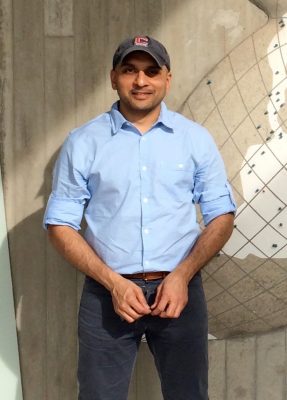Student Spotlight: Nirav Patel

What is your area of research?
Broadly, I use environmental psychology and cognitive science within education domains to understand environmental behavior of K-12 educators and their students. My research emphasizes cognitive-behavioral perspectives, specifically the role of norms that engage environmental attitudes to behavioral intent when it comes to renewable energy.
How do you integrate research into your teaching or vice versa?
I find learning brings the two silos of teaching and research together. I view teaching and research to be synergistic, and apply strategies to interweave my research with teaching. I have adopted a student-centered teaching and learning practice, which makes it intrinsically favorable to cultivate a positive feedback loop between research and teaching.
What inspired you to choose this field of study?
I am driven by the urgency of environmental issues such as climate change and sustainable sources of food, energy, and water. Natural resources was a perfect choice for field of study since it allows me to cast a wide net that can capture interdisciplinary focused research on such issues.
Why is this research important?
Often our behavior can be detrimental to our environment. We have to quickly learn when and how individuals behave in pro-environmental ways. If we are to change the trajectory in a way that can put conservation efforts on the offense, then research addressing the linkage between environmental attitudes and human behavior is critical. Much of the emphasis of discussions on Anthropocene has been on our cumulative impact on the biophysical and ecological systems. There has been limited emphasis on individual impacts such as the individual cognitive capacity that prompts our behavior.
How has your background influenced your scholarship and teaching?
I believe students crave information that can tie what they learn in one discipline to the other. My multidisciplinary training in biology, agriculture (horticulture), and natural resources offers the ability to connect topics, which makes student learning more engaging.
What else has influenced your thinking as a researcher, scholar, and teacher?
As a child growing up in India, I was always amazed by the depth and breadth of nature. The experience has bolstered my view of discovery science as a teaching tool. The ability to harness discovery science that allows students to explore patterns in nature and understand the importance of collaborative learning remains vital to my teaching interests.
You recently received a travel grant from Cornell’s Center for the Integration of Research, Teaching and Learning (CIRTL at Cornell) to attend a conference at Northwestern University. How did you learn about this grant and what was the process of applying like?
I learned about the conference through the CIRTL Network and I was one of the only two Ph.D. candidates selected to present at what was essentially a faculty conference. Thus, I approached CIRTL at Cornell director Dr. Colleen McLinn to ask if there were funds for such travel participation and after a short application process, CIRTL at Cornell granted a travel award. I have never encountered such a speedy and helpful process at my time here at Cornell University.
Can you tell me a little more about the conference itself and what you presented there?
The conference was on integrating cognitive science with innovative teaching in STEM disciplines. It was focused on spatial learning in STEM. I presented my doctoral research work on renewable energy education. Energy education offers students the opportunity to learn STEM concepts. My study evaluates whether and how students taught by trained teachers will acquire positive attitudes toward climate change and renewable energy. I presented findings that suggest that students show an increased interest in renewable energy education if educators formalize it within STEM courses. I also presented on how an interdisciplinary STEM curriculum based on a spatial training program will be able to bring climate change and renewable energy to the forefront with immediate issues such as hunger and poverty.
What’s next for you?
I will be graduating over summer and I plan to stay in academia and continue my research work. I hope to provide research and training opportunities that can help train the next generation of community-engaged scholars focused on issues such as sustainable food, energy, and water. Ultimately, I believe we need to connect classroom experience with hands-on cultural and environmental learning experiences.
Interview by Sally Kral, communications and outreach assistant in the Graduate School
